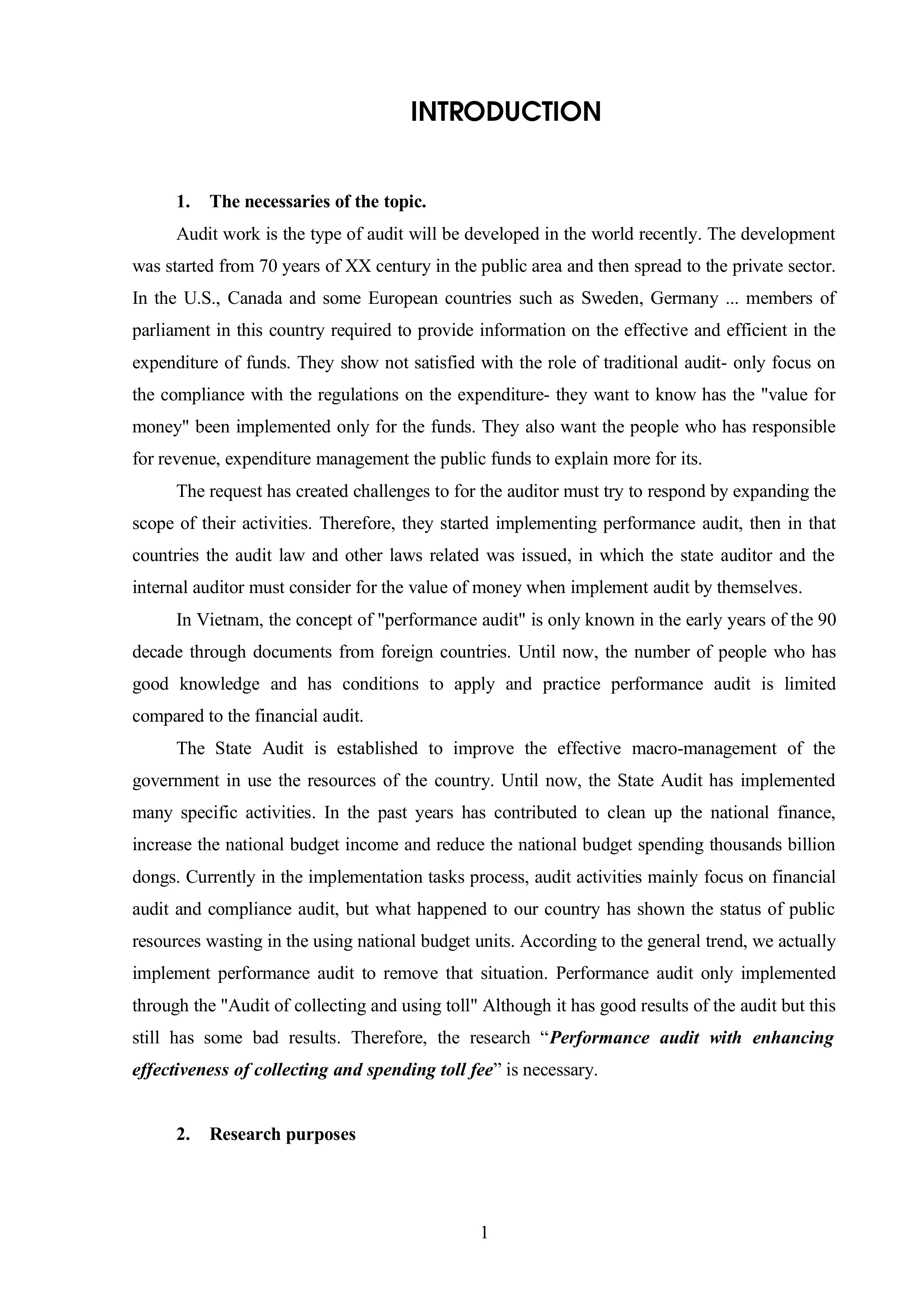Thư viện tri thức trực tuyến
Kho tài liệu với 50,000+ tài liệu học thuật
© 2023 Siêu thị PDF - Kho tài liệu học thuật hàng đầu Việt Nam

Tài liệu đang bị lỗi
File tài liệu này hiện đang bị hỏng, chúng tôi đang cố gắng khắc phục.
Performance audit with enhancing effectiveness of collecting and spending toll fee
Nội dung xem thử
Mô tả chi tiết
Introduction
1. The necessaries of the topic.
Audit work is the type of audit will be developed in the world recently. The development
was started from 70 years of XX century in the public area and then spread to the private sector.
In the U.S., Canada and some European countries such as Sweden, Germany ... members of
parliament in this country required to provide information on the effective and efficient in the
expenditure of funds. They show not satisfied with the role of traditional audit- only focus on
the compliance with the regulations on the expenditure- they want to know has the "value for
money" been implemented only for the funds. They also want the people who has responsible
for revenue, expenditure management the public funds to explain more for its.
The request has created challenges to for the auditor must try to respond by expanding the
scope of their activities. Therefore, they started implementing performance audit, then in that
countries the audit law and other laws related was issued, in which the state auditor and the
internal auditor must consider for the value of money when implement audit by themselves.
In Vietnam, the concept of "performance audit" is only known in the early years of the 90
decade through documents from foreign countries. Until now, the number of people who has
good knowledge and has conditions to apply and practice performance audit is limited
compared to the financial audit.
The State Audit is established to improve the effective macro-management of the
government in use the resources of the country. Until now, the State Audit has implemented
many specific activities. In the past years has contributed to clean up the national finance,
increase the national budget income and reduce the national budget spending thousands billion
dongs. Currently in the implementation tasks process, audit activities mainly focus on financial
audit and compliance audit, but what happened to our country has shown the status of public
resources wasting in the using national budget units. According to the general trend, we actually
implement performance audit to remove that situation. Performance audit only implemented
through the "Audit of collecting and using toll" Although it has good results of the audit but this
still has some bad results. Therefore, the research “Performance audit with enhancing
effectiveness of collecting and spending toll fee” is necessary.
2. Research purposes
1
Based on researching the argument issues about performance audit and practices of the
"Audit of collecting and using toll" propose the solutions to improve performance audit to
enhance economic, efficiency and effectiveness in administer public resources in using national
budget.
3. Research objectives and scope
This is a very new theory and practice issue, because performance audit just has applied
in our country in a short time, so maybe there are some mistakes in searching. Therefore, we
only focus on some issues of performance audit and process auditing in our country now. The
objectives of the research are:
- Forming the scientific basis which is the base of performance Audit.
- Analyzing, estimating, making clear the issues about performance audit in "Audit of
collecting and using toll"
- Investigating and giving opinions, solutions and petitions in order to improve the
performance audit in audit the using national budget units.
4. Research methods.
The essay mainly research on performance audit and performance audit process in the
using national budget units, so the main methods are organizing, analysis and synthesis…
The essay include 58 pages, besides the introduction and conclusion, the researching has
3 chapters.
Chapter I: The theoretical framework of Performance Audit in using national budget units
Chapter II: The real situation of Performance Audit with regard to collection and
spending toll fees in viet nam
Chapter III: Solutions to improve performance audit with regard to collection and
spending toll fees
2
Chapter I
The theoretical framework of Performance Audit in
using national budget units
1.1. The basic problems of performance Audit
1.1.1. Definition of performance audit?
The term “Audit” includes financial audit, compliance audit and performance audit. It
further adds that in pursuance of the constitutional responsibility, The SAI is empowered to
decide the nature, scope, extent and quantum of audit to be conducted by it or on its behalf.
INTOSAI Audit standard 1.0.40 defines the performance audit as under:
“Performance audit is concerned with the audit of economy, efficiency, effectiveness, and
embraces:
Audit of the economy of the administrative activities in accordance with sound
administrative principles and management policies;
Audit of the efficiency of utilization of human, financial and other resources, including
examination of information systems, performance measures and monitoring arrangements and
procedures followed by audited entities for remedying identified deficiencies;
Audit of the effectiveness of performance in relation to the achievement of the
objectiveness of the audited entity and audit of the actual impact of activities compared with the
intended impact.”
Performance auditing is an independent assessment or examination of the extent to which
an entity, program or organization operates efficiently and effectively, which due regard to
economy.
In practice, there can be an overlap between compliance and performance auditing and in
such a cases, classification of a particular audit will depend on the primary purpose of that
audit. Compliance audit embraces attestation of financial accountability involving expression of
opinion on financial statements, audit of financial systems and transactions, including an
evaluation of compliance with applicable statues and regulations, audit of internal control and
internal audit functions and audit of probity and propriety of administrative decisions taken
within the audited entity.
3